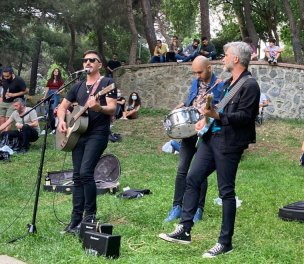Click to read the article in Turkish
The organizer of the Zeytinli Rock Festival has criticized the festival's cancellation by the authorities, saying that the decision lacked legal basis.
"Our lawyers made the necessary objections to the arbitrary decision of the Burhaniye Sub-governor's Office, which had no valid legal basis and whose content we learned first from the press," the Milyonfest company said in a written statement today (August 12) "However, unfortunately, the Burhaniye Sub-governor's Office gave a negative response to our petition of appeal. We leave the judgment to the public."
One of the longest-running music festivals in the country, the festival was going to take place in Burhaniye, Balıkesir, in northwestern Türkiye.
However, the sub-governor's office rejected the company's application to hold the festival for "public security" reasons, citing "complaints by citizens."
About 70 bands and musicians were going to perform at the festival planned to take place between August 17 and 21.
Pressure from religious groups
Days before the ban, the Balıkesir branch of the Community for Spreading Wisdom (İlim Yayma Cemiyeti), one of the largest conservative NGOs in Türkiye, released a statement condemning the festival, where it claimed "prostitution, rape and harassment took place in public."
Milyonfest also touched on the group's statement, saying, "We regret to say that after a statement by a foundation that we do not understand what contribution it made to the region, the Balıkesir Governor's Office and the Burhaniye Sub-governor's Office began acting as if they had sworn to do their best to prevent the festival this year.
"We hadn't taken seriously the claims that some religious orders had pressured the state institutions for the cancellation of the festival. But what we have experiences started to make us think that what we were told was more than just gossip."
Concert and festival bans
The government and municipalities have banned several concerts the past couple of years for similar reasons, as well as introducing a live music ban after midnight as part of the coronavirus measures, which has remained in place despite the lifting of all other restrictions.
Another music festival was banned in May in Eskişehir, a city with a high student population, in a decision supported by some religious communities in the city.
Also, spring festivals in many universities have been canceled or turned into "alcohol-free" events. (AÖ/VK)









